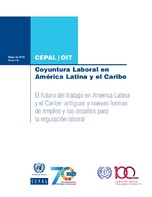Adulthood
Although people between 30 and 64 years of age currently account for a fourth of the population in Latin America and the Caribbean, and that share is estimated to grow considerably, they are currently not regarded as a social policy priority. However, the adult population is expected to provide the necessary income to contribute to closing inequality gaps in other age groups, in a context in which the adult population itself faces various inequality gaps.






















